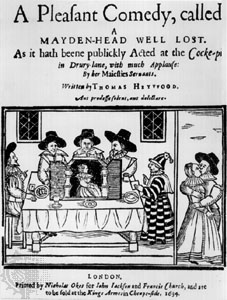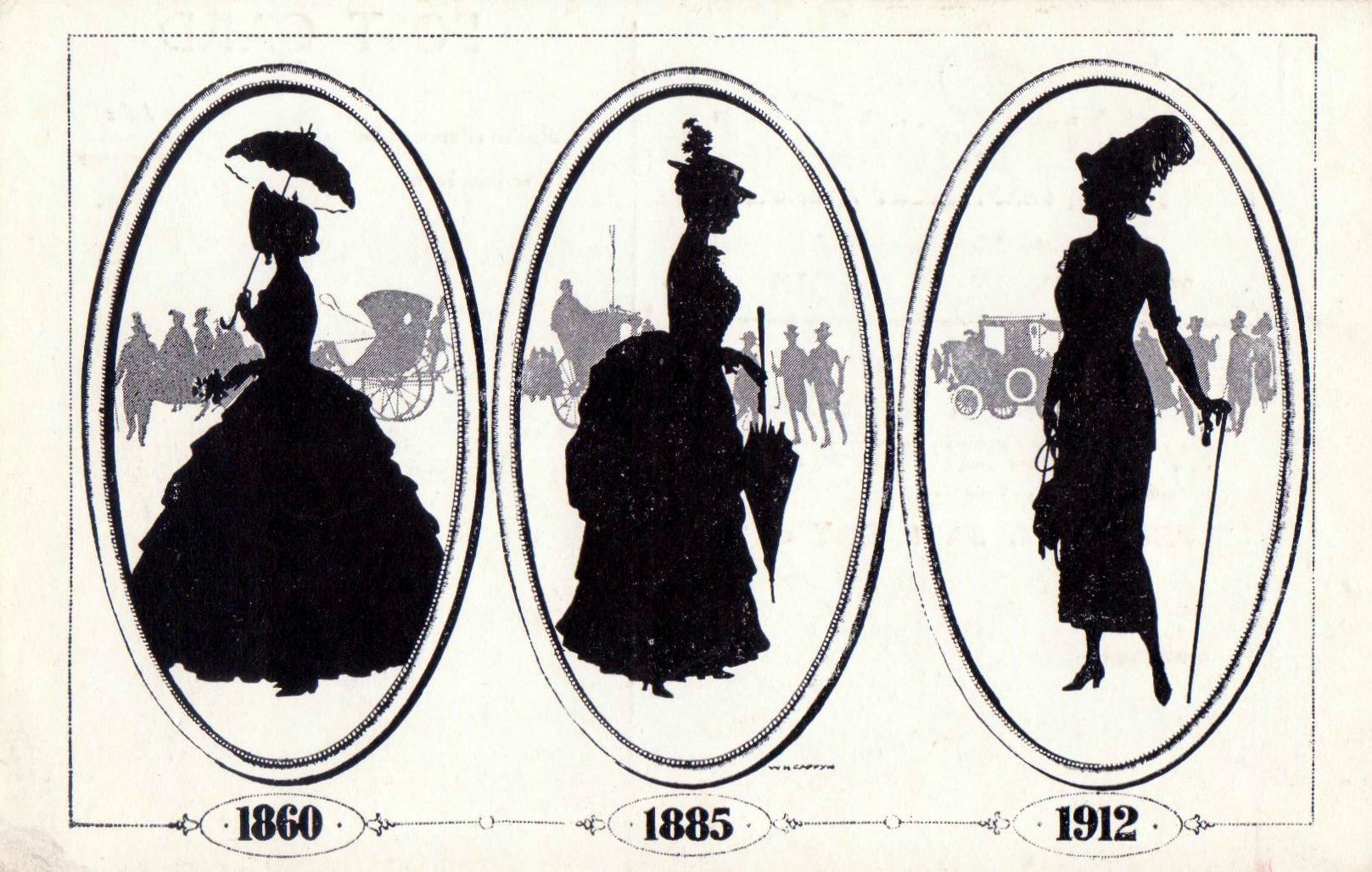|
A Maidenhead Well Lost
''A Pleasant Comedy, called A Maidenhead Well Lost'' is a dark comedy set in Italy; it was written and published by Thomas Heywood in 1634 and performed at The Cockpit by Queen Henrietta's Men in that same year. The plot centres on Julia, the daughter of the Duke of Milan, who finds herself pregnant before she is officially married to the Prince of Parma. A sub-plot of the play is the story of Lauretta, who finds herself banished from the court of Milan and ends up falling in love with the Prince of Florence. Synopsis Actus Primus The first act of the play opens with the Duke of Milan's secretary, Stroza, having a conversation with Julia. During this conversation, Stroza hints very broadly that the Prince of Parma, Julia's fiancé, has taken Lauretta as his mistress. Although she does not, at first, believe him, Stroza manages to convince her that it is true and Julia goes off lamenting that she ever slept with the Prince. Stroza then encounters the Prince of Parma, who is look ... [...More Info...] [...Related Items...] OR: [Wikipedia] [Google] [Baidu] |
Thomas Heywood
Thomas Heywood (early 1570s – 16 August 1641) was an English playwright, actor, and author. His main contributions were to late Elizabethan and early Jacobean theatre. He is best known for his masterpiece ''A Woman Killed with Kindness'', a domestic tragedy, which was first performed in 1603 at the Rose Theatre by the Worcester's Men company. He was a prolific writer, claiming to have had "an entire hand or at least a maine finger in two hundred and twenty plays", although only a fraction of his work has survived. Early years Few details of Heywood's life have been documented with certainty. Most references indicate that the county of his birth was most likely Lincolnshire, while the year has been variously given as 1570, 1573, 1574 and 1575. It has been speculated that his father was a country parson and that he was related to the half-century-earlier dramatist John Heywood, whose death year is, again, uncertain, but indicated as having occurred not earlier than 1575 and n ... [...More Info...] [...Related Items...] OR: [Wikipedia] [Google] [Baidu] |
Cockpit Theatre
The Cockpit was a theatre in London, operating from 1616 to around 1665. It was the first theatre to be located near Drury Lane. After damage in 1617, it was named The Phoenix. History The original building was an actual cockpit; that is, a staging area for cockfights. Most likely a round building with a peaked roof, about in diameter, it was erected under Henry VIII, c. 1530-32, as part of a gaming complex. Records indicate a major restoration in 1581-82 and renovations in 1589-90, 1602-3, and 1608-9 (the latter under the supervision of John Best, "cockmaster" to Henry Frederick, Prince of Wales, King James I of England, James I's eldest son and heir). In August 1616, Christopher Beeston acquired the lease to the building and converted it to an indoor playhouse. In March 1617, rioting apprentices attempted to destroy the playhouse, probably out of anger that their favorite plays had been removed from the Red Bull outdoor amphitheater, which charged only one penny for admissio ... [...More Info...] [...Related Items...] OR: [Wikipedia] [Google] [Baidu] |
Queen Henrietta's Men
Queen Henrietta's Men was an important playing company or troupe of actors in Caroline era in London. At their peak of popularity, Queen Henrietta's Men were the second leading troupe of the day, after only the King's Men. Beginnings The company was formed in 1625, at the start of the reign of King Charles I, by theatrical impresario Christopher Beeston under royal patronage of the new queen, Henrietta Maria of France. They were sometimes called the Queen's Majesty's Comedians or other variations on their name. The company was founded after an eight-month closure of the London theatres due to bubonic plague (March to October, 1625). The Lady Elizabeth's Men, then called the Queen of Bohemia's Men, had been resident at Beeston's Cockpit Theatre up to the plague closing, and provided the foundation of the new organization. Success Theatre manager Beeston had had several different companies acting in his Cockpit Theatre since he started it in 1617; it was with Queen Henrietta's Men ... [...More Info...] [...Related Items...] OR: [Wikipedia] [Google] [Baidu] |
Dumbshow
Dumbshow, also dumb show or dumb-show, is defined by the ''Oxford Dictionary of English'' as "gestures used to convey a meaning or message without speech; mime." In the theatre the word refers to a piece of dramatic mime in general, or more particularly a piece of action given in mime within a play "to summarise, supplement, or comment on the main action". In the ''Oxford Encyclopedia of Theatre and Performance'', Michael Dobson writes that the dumbshow was originally "an allegorical survival from the morality play". It came into fashion in 16th-century English drama in interludes featuring "personifications of abstract virtues and vices who contend in ways which foreshadow and moralize the fortunes of the play's characters".Dobson, Michael"dumb show" ''The Oxford Encyclopedia of Theatre and Performance'', Oxford University Press, 2003, retrieved 29 November 2015 There are examples in ''Gorboduc'' (1561) throughout which dumbshow plays a major part, and in Thomas Kyd's ''The Spani ... [...More Info...] [...Related Items...] OR: [Wikipedia] [Google] [Baidu] |
Dumbshow
Dumbshow, also dumb show or dumb-show, is defined by the ''Oxford Dictionary of English'' as "gestures used to convey a meaning or message without speech; mime." In the theatre the word refers to a piece of dramatic mime in general, or more particularly a piece of action given in mime within a play "to summarise, supplement, or comment on the main action". In the ''Oxford Encyclopedia of Theatre and Performance'', Michael Dobson writes that the dumbshow was originally "an allegorical survival from the morality play". It came into fashion in 16th-century English drama in interludes featuring "personifications of abstract virtues and vices who contend in ways which foreshadow and moralize the fortunes of the play's characters".Dobson, Michael"dumb show" ''The Oxford Encyclopedia of Theatre and Performance'', Oxford University Press, 2003, retrieved 29 November 2015 There are examples in ''Gorboduc'' (1561) throughout which dumbshow plays a major part, and in Thomas Kyd's ''The Spani ... [...More Info...] [...Related Items...] OR: [Wikipedia] [Google] [Baidu] |
Domestic Drama
Domestic drama expresses and focuses on the realistic everyday lives of middle or lower classes in a certain society, generally referring to the post-Renaissance eras. According to the ''English Communications Syllabus'', domestic drama refers to a dramatic story containing an emphasis on its “characters' intimate relationships and their responses to heunfolding events in their lives.” The characters, their lives, and the events that occur within the show are usually classified as 'ordinary' events, lives, and characters, but this does not limit the extent of what domestic drama can represent. Domestic drama does, however, take the approach in which it “concerns people much like ourselves, taken from the lower and middle classes of society, who struggle with everyday problems such as poverty, sickness, crime, and family strife.”a domestic drama is a drama that is usually being used in comedy. Roots Domestic is derived from the Latin domus, or home. The word domestic is def ... [...More Info...] [...Related Items...] OR: [Wikipedia] [Google] [Baidu] |
Histriomastix
''Histriomastix: The Player's Scourge, or Actor's Tragedy'' is a critique of professional theatre and actors, written by the Puritan author and controversialist William Prynne. Publication While the publishing history of the work is not absolutely clear, ''Histriomastix'' was published late in 1632 by the bookseller Michael Sparke. It had been in preparation by its author for almost ten years before its printing. The title page of the first edition is erroneously dated 1633; as a result many sources cite this as the date of publication. Depositions given in connection with Prynne's trial indicate that the actual writing of the text was accomplished between spring 1631 and mid-to-late 1632. Themes ''Histriomastix'' represents the culmination of the Puritan attack on the English Renaissance theatre and celebrations such as Christmas, as noted in the following: "Our Christmas lords of misrule, together with dancing, masks, mummeries, state players, and such other Christmas disorders ... [...More Info...] [...Related Items...] OR: [Wikipedia] [Google] [Baidu] |
Anti-theatrical Discourse
Antitheatricality is any form of opposition or hostility to theater. Such opposition is as old as theater itself, suggesting a deep-seated ambivalence in human nature about the dramatic arts. Jonas Barish's 1981 book, ''The Antitheatrical Prejudice'', was, according to one of his University of California, Berkeley, Berkeley colleagues, immediately recognized as having given intellectual and historical definition to a phenomenon which up to that point had been only dimly observed and understood. The book earned the American Theater Association's Barnard Hewitt Award for outstanding research in theater history. Barish and some more recent commentators treat the anti-theatrical, not as an enemy to be overcome, but rather as an inevitable and valuable part of the theatrical dynamic. Antitheatrical views have been based on philosophy, religion, morality, psychology, aesthetics and on simple prejudice. Opinions have focussed variously on the art form, the artistic content, the players, th ... [...More Info...] [...Related Items...] OR: [Wikipedia] [Google] [Baidu] |
William Prynne
William Prynne (1600 – 24 October 1669), an English lawyer, voluble author, polemicist and political figure, was a prominent Puritan opponent of church policy under William Laud, Archbishop of Canterbury (1633–1645). His views were presbyterian, but he became known in the 1640s as an Erastian, arguing for overall state control of religious matters. Early life Born at Swainswick, near Bath, Somerset, William Prynne was educated at Bath Grammar School and Oriel College, Oxford. He graduated as a BA on 22 January 1621, entered as a student of Lincoln's Inn in the same year, and was called to the bar in 1628. According to Anthony Wood, he was confirmed in his militant puritanism by the influence of John Preston, then a lecturer at Lincoln's Inn. In 1627 he published his first of over 200 works, a theological treatise titled ''The Perpetuity of a Regenerate Man's Estate''. This was followed in the next three years by three others attacking Arminianism and its teachers. In the ... [...More Info...] [...Related Items...] OR: [Wikipedia] [Google] [Baidu] |
An Apology To Actors
An, AN, aN, or an may refer to: Businesses and organizations * Airlinair (IATA airline code AN) * Alleanza Nazionale, a former political party in Italy * AnimeNEXT, an annual anime convention located in New Jersey * Anime North, a Canadian anime convention * Ansett Australia, a major Australian airline group that is now defunct (IATA designator AN) * Apalachicola Northern Railroad (reporting mark AN) 1903–2002 ** AN Railway, a successor company, 2002– * Aryan Nations, a white supremacist religious organization * Australian National Railways Commission, an Australian rail operator from 1975 until 1987 * Antonov, a Ukrainian (formerly Soviet) aircraft manufacturing and services company, as a model prefix Entertainment and media * Antv, an Indonesian television network * ''Astronomische Nachrichten'', or ''Astronomical Notes'', an international astronomy journal * '' Avisa Nordland'', a Norwegian newspaper * '' Sweet Bean'' (あん), a 2015 Japanese film also know ... [...More Info...] [...Related Items...] OR: [Wikipedia] [Google] [Baidu] |
Plays By Thomas Heywood
Play most commonly refers to: * Play (activity), an activity done for enjoyment * Play (theatre), a work of drama Play may refer also to: Computers and technology * Google Play, a digital content service * Play Framework, a Java framework * Play Mobile, a Polish internet provider * Xperia Play, an Android phone * Rakuten.co.uk (formerly Play.com), an online retailer * Backlash (engineering), or ''play'', non-reversible part of movement * Petroleum play, oil fields with same geological circumstances * Play symbol, in media control devices Film * ''Play'' (2005 film), Chilean film directed by Alicia Scherson * ''Play'', a 2009 short film directed by David Kaplan * ''Play'' (2011 film), a Swedish film directed by Ruben Östlund * ''Rush'' (2012 film), an Indian film earlier titled ''Play'' and also known as ''Raftaar 24 x 7'' * ''The Play'' (film), a 2013 Bengali film Literature and publications * ''Play'' (play), written by Samuel Beckett * ''Play'' (''The New York ... [...More Info...] [...Related Items...] OR: [Wikipedia] [Google] [Baidu] |
1634 Plays
Events January–March * January 12– After suspecting that he will be dismissed, Albrecht von Wallenstein, supreme commander of the Holy Roman Empire's Army, demands that his colonels sign a declaration of personal loyalty. * January 14– France's ''Compagnie normande'' obtains a one-year monopoly on trade with the African kingdoms in Guinea. * January 19– Charles IV, Duke of Lorraine abdicates in favor of his brother Nicholas II, who is only able to hold the throne for 75 days. * January 24– Ferdinand II, Holy Roman Emperor, signs a classified order dismissing Albrecht von Wallenstein, the supreme commander of the Imperial Army. * February 18– Emperor Ferdinand II's dismissal of Commander Wallenstein for high treason, and the order for his capture, dead or alive, is made public. * February 25– Rebel Scots and Irish soldiers assassinate Bohemian military leader Albrecht von Wallenstein at Cheb. * March 1 – The Russians vaca ... [...More Info...] [...Related Items...] OR: [Wikipedia] [Google] [Baidu] |




